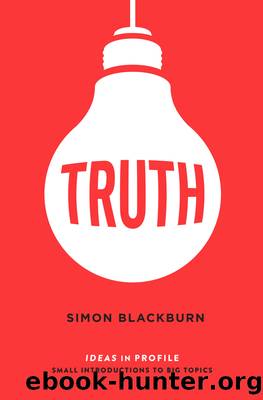Truth by Simon Blackburn

Author:Simon Blackburn
Language: eng
Format: epub
Publisher: Profile
PART II
VARIETIES OF ENQUIRY
7
TRUTHS OF TASTE; TRUTH IN ART
It may seem strange to start with this domain. Questions of taste are often thought not to admit of truth or falsity at all. People have their own opinions. A salient fact about taste and preferences in matters of taste is that people differ. In this domain, and others we’ll come to, there is a variation of subjective responses, and this makes it awkward to defend any idea of the one true taste. Actually, variations of subjective taste and preference would not matter if we could simply see that some tastes are inferior to others, thereby recapturing some sense of authority and truth. But this too may be hard to defend. The old maxim de gustibus non est disputandum – tastes are not to be disputed – is practically a cliché. The thought is pretty much cemented into classical economics when people’s preferences are simply taken as they are. None are to be discounted, for they are all immune to rational pressure. Some may be strange, but unless they trespass on the rightful space of other people, in which case moral considerations arise, none are better or worse for that. But this is exactly what makes aesthetics an appropriate starting point for applying the discussion we have had so far. If truth can hold its head up in this context, it can surely find a home in others, where it is of more obvious importance to get things right, and to persuade others to do so.
If we follow Peirce’s maxim and begin with men and their conversation we find that things are not quite so straightforward as the old maxim implies. There exist, after all, practices of criticism. There are professional music critics, literary critics, drama critics, wine critics, food critics and so on. People listen to them, and often respect them, even if they sometimes disagree with them. We may be inclined to scoff: perhaps the critics are distributing arbitrary badges of fashion that their audiences are snobbishly anxious to display (this was roughly the view of Jean-Jacques Rousseau). But before we scoff it may pay to look a little closer. Fortunately, critics themselves have provided ample commentary on their own procedures.
Henry James, for instance, a prolific literary critic as well as a novelist, characterised himself not as ‘the narrow lawgiver or the rigid censor’, but as ‘the student, the inquirer, the observer, the interpreter, the active, indefatigable commentator, whose constant aim was to arrive at justness of characterization’. To take first the negative claim, James gives a splendid rebuttal of the idea that it is appropriate for critics to ‘lay down the law’ in one of his early essays, ‘Italy Revisited’.20 He has bought a copy of Mornings in Florence, by the fierce and dogmatic Victorian critic John Ruskin, and is eventually moved to hilarity:
I had really been enjoying the good old city of Florence; but I now learned from Mr. Ruskin that this was a scandalous waste of charity.
Download
This site does not store any files on its server. We only index and link to content provided by other sites. Please contact the content providers to delete copyright contents if any and email us, we'll remove relevant links or contents immediately.
The remains of the day by Kazuo Ishiguro(7551)
Tools of Titans by Timothy Ferriss(6946)
The Black Swan by Nassim Nicholas Taleb(6190)
Inner Engineering: A Yogi's Guide to Joy by Sadhguru(5895)
Giovanni's Room by James Baldwin(5877)
The Way of Zen by Alan W. Watts(5798)
The Six Wives Of Henry VIII (WOMEN IN HISTORY) by Fraser Antonia(4790)
The Power of Now: A Guide to Spiritual Enlightenment by Eckhart Tolle(4755)
Astrophysics for People in a Hurry by Neil DeGrasse Tyson(4620)
Asking the Right Questions: A Guide to Critical Thinking by M. Neil Browne & Stuart M. Keeley(4574)
12 Rules for Life by Jordan B. Peterson(3733)
The Ethical Slut by Janet W. Hardy(3502)
Skin in the Game by Nassim Nicholas Taleb(3460)
Housekeeping by Marilynne Robinson(3401)
The Art of Happiness by The Dalai Lama(3382)
Double Down (Diary of a Wimpy Kid Book 11) by Jeff Kinney(3272)
Skin in the Game: Hidden Asymmetries in Daily Life by Nassim Nicholas Taleb(3264)
Walking by Henry David Thoreau(3234)
12 Rules for Life: An Antidote to Chaos by Jordan B. Peterson(3200)
